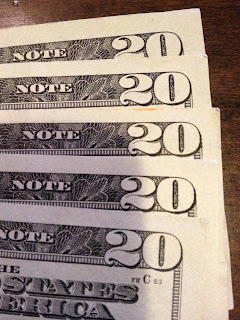The Purpose of Profits
Today I spoke with a young entrepreneur I know. He has built a thriving business that provides income for half a dozen people, and now he is thinking about what to do with his business. His plan, he says, is to use it as a source of income for non-profits.
This entrepreneur -- let's call him Tom* -- believes that the purpose of profit is to do good for others. He seems to be a deeply religious man, and he sees this as a way of sharing the gifts he has received from God with others. Says he doesn't see why any CEO needs to make more than enough, which he defines as being about $70,000 a year.
Tom is one of those people who make me pause and reconsider my own financial goals, hopes, and fears. When I think about investing and saving, I admit I'm worried about not having enough someday. What if I lose my job, or suffer an injury that keeps me from working? Will we have enough for us to provide for our kids and to retire on?
Tom's view is peculiar: he would rather have a rich community than a rich savings account. He's trying to embody the lesson of the "parable of the unjust manager," who decided it was better to have friends than money; or of the stories of the early church in the Book of Acts. If I remember right, those stories inspired Karl Marx as well.
My friend Tom is no St Francis, and he's not taking a vow of poverty. He's just drawing a line and refusing to let the clamor of financial fear drown out the song of hope. Like so many religious people, his hopes are as extravagant as they are counter-cultural. And they're prophetic, at least in the way Cornel West uses that word. At least, that's what I heard in Tom's story today: he wants to do good with his money, and some of that good will be reminding us that fear is not a good master.
A few years ago a friend who taught in the business school at Penn State was engaged in a study of businesses that were trying to bring together the ideals of for-profits and non-profits - businesses like Nutriset - that were trying to generate profits by producing good things at reasonable prices. I have to say that dreaming about this way of combining capitalism and social good inspires me.
*I'm not giving out his name or his business name because I don't want to cause him to be flooded with funding requests.
This entrepreneur -- let's call him Tom* -- believes that the purpose of profit is to do good for others. He seems to be a deeply religious man, and he sees this as a way of sharing the gifts he has received from God with others. Says he doesn't see why any CEO needs to make more than enough, which he defines as being about $70,000 a year.
 |
| Can't buy me love. |
Tom is one of those people who make me pause and reconsider my own financial goals, hopes, and fears. When I think about investing and saving, I admit I'm worried about not having enough someday. What if I lose my job, or suffer an injury that keeps me from working? Will we have enough for us to provide for our kids and to retire on?
Tom's view is peculiar: he would rather have a rich community than a rich savings account. He's trying to embody the lesson of the "parable of the unjust manager," who decided it was better to have friends than money; or of the stories of the early church in the Book of Acts. If I remember right, those stories inspired Karl Marx as well.
My friend Tom is no St Francis, and he's not taking a vow of poverty. He's just drawing a line and refusing to let the clamor of financial fear drown out the song of hope. Like so many religious people, his hopes are as extravagant as they are counter-cultural. And they're prophetic, at least in the way Cornel West uses that word. At least, that's what I heard in Tom's story today: he wants to do good with his money, and some of that good will be reminding us that fear is not a good master.
A few years ago a friend who taught in the business school at Penn State was engaged in a study of businesses that were trying to bring together the ideals of for-profits and non-profits - businesses like Nutriset - that were trying to generate profits by producing good things at reasonable prices. I have to say that dreaming about this way of combining capitalism and social good inspires me.
*****
*I'm not giving out his name or his business name because I don't want to cause him to be flooded with funding requests.